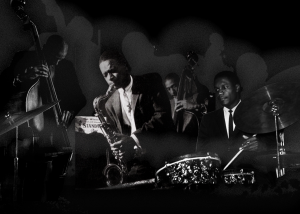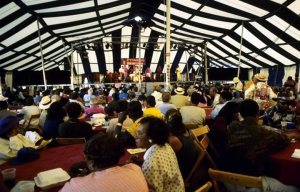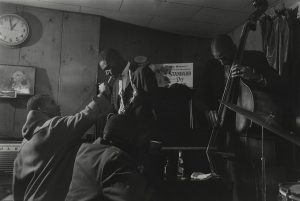Our Project
Making a Public History project about Rochester's Corn Hill neighborhood in the wake of COVID-19
In a perfect world, HIS 240 would have afforded you the learning process of self-organization and face-to-face, community-engaged collaboration.
We, sadly, are no longer living in a perfect world.
Or so begins our second syllabus quickly devised by professors Molly Ball and Mike Jarvis in the wake of COVID-19 as we realized our community-focused, physical exhibit would have to move entirely digital. But as teams were reassigned and tasks were entirely restructured, we maintained a steady focus on the purpose of the original class: promote and launch a Public History project representing Rochester’s historic and diverse Corn Hill (Third Ward) neighborhood.
Our project is inspired by, and largely focused around, Corn Hill’s former Pythodd Club. Once a lively jazz club at the heart of that neighborhood, the former site of the Pythodd Club is now a parking lot adorned with a small, commemorative plaque. However, its spirit triumphantly and persistently lives on. The spirit of the Pythodd is alive in its former patrons, musicians, and its community; it is alive in its fellow demolished clubs like the Ridge Crest Inn and Squeezer’s; and it is alive a few times a year when spectacular events like the Rochester International Jazz Festival leave jazz resounding through our city’s streets.
It is this spirit, and all the fascinating and complicated history that comes with it, that we would like to promote. We hope you enjoy. . .
The Spirit of the Pythodd






Our Research Process
Our initial plan was to focus most of our research efforts on conducting community interviews. Our background research would have then filled in gaps, resolved conflicts, and provided context. We hoped that, through this approach, our exhibit would tell the story of the Pythodd and its legacy from the perspective of the community. Our research process, like everything else, was changed by COVID-19. The pandemic made conducting more interviews impossible. Our background research into the Pythodd, which had shifted to in person archive visits, also had to stop. Adapting to these changes necessitated adapting the exhibit. We added the theme of Rochester jazz (Jazzchester) to open the door to more digital research. We also shifted the theme of the Pythodd sections so they could be built from the research we had and not, unfortunately, from further community interviews. We have made our research available in the “digital archive” section of our website. We hope that the research we conducted will provide a good starting point for future Pythodd projects. Please contact us with any questions involving our research.
Snapshots

Shortly after we were alerted that campus would be closing and classes would be moving online, Dr. Ball immediately began planning how we would adapt to the dramatic circumstances.
In addition to email and weekly video meetings, Slack became one of our main platforms for communication. Here, we’ve developed a variety of channels to organize and discuss a variety of website elements.


Some love it, some hate it; but regardless, our class meets once a week for the full three-hour seminar length via a Zoom video call. Here, Blair Tinker (upper left) with the Digital Scholarship Lab, is giving us advice on how to best utilize our WordPress platform.
A few of us knew how complicated learning WordPress can be, but none of us expected to try and teach it to each other entirely digital. To combat the difficulty, our team held weekly work sessions for students to work together and ask each other questions.

Public History: Theory and Practice
HIS 240/440 was offered Spring 2020 through the University of Rochester History Department




